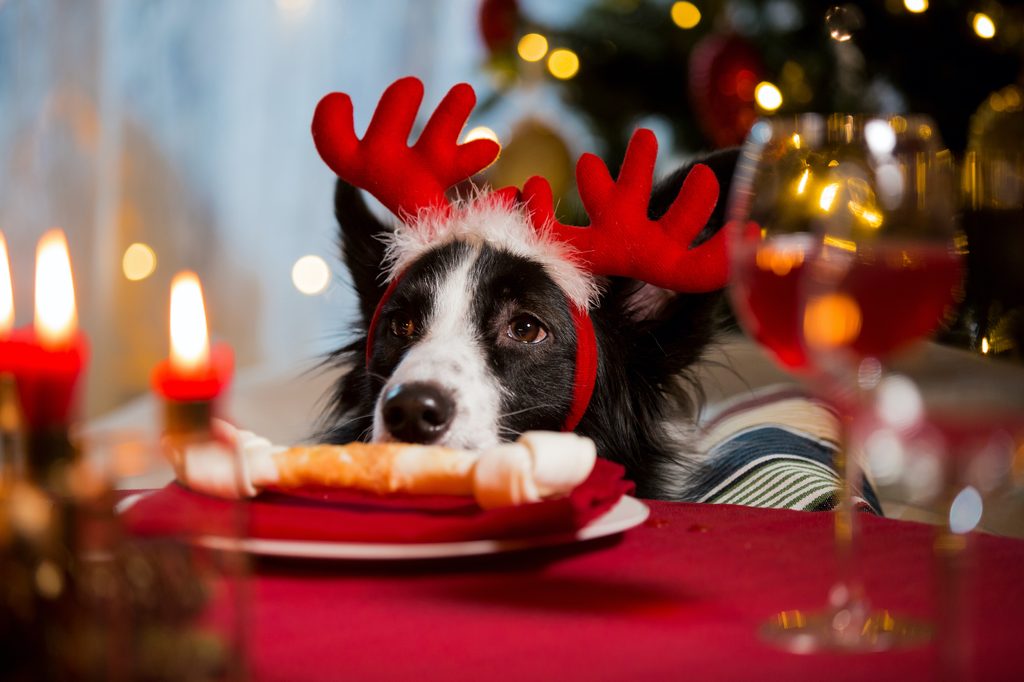
It’s the most wonderful time of the year — for festivities and for food! From peppermint everything to Mom’s famous roast turkey, there’s no shortage of delicious Christmas delicacies for to enjoy. Here’s where it gets complicated, though: These recipes aren’t necessarily safe for everyone in your family. Only some human foods are safe for dogs. Since canines have their own dietary needs and preferences, there are many festive treats they should stay away from.
Many of these are known no-nos for dogs — chocolate, grapes, alcohol, etc. — but a few may surprise you. We’ll cover popular holiday snacks, main courses, and even a few sweet treats, though a quick online search will help you learn about any ingredients we might have missed. When in doubt, you’ll never go wrong buying your dog their own holiday treats!
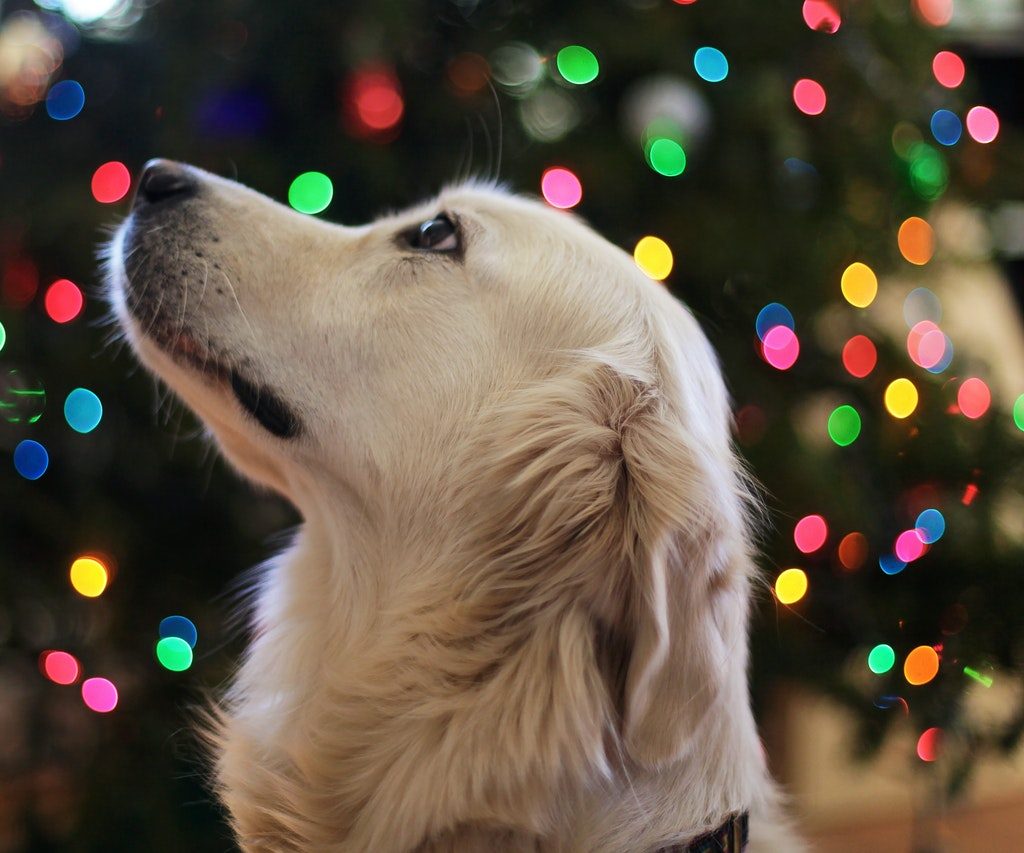
Can dogs eat Christmas foods? The answer isn’t as straightforward as you think
Just like any food-centered holiday, Christmas is a tempting time to slip your pet something off the table. You’d be wise to be careful, though, because many human foods aren’t safe for your furry friend to enjoy — no matter how much they may love the taste.
You may find yourself asking questions like, “can dogs eat turkey?” If so, you might want to research quickly before tossing your beloved pet a snack (Don’t worry — we’ve done the work for you!). Lots of foods, such as turkey, are safe for pups, but they need to be prepared in a specific way.
Here are some of those foods.
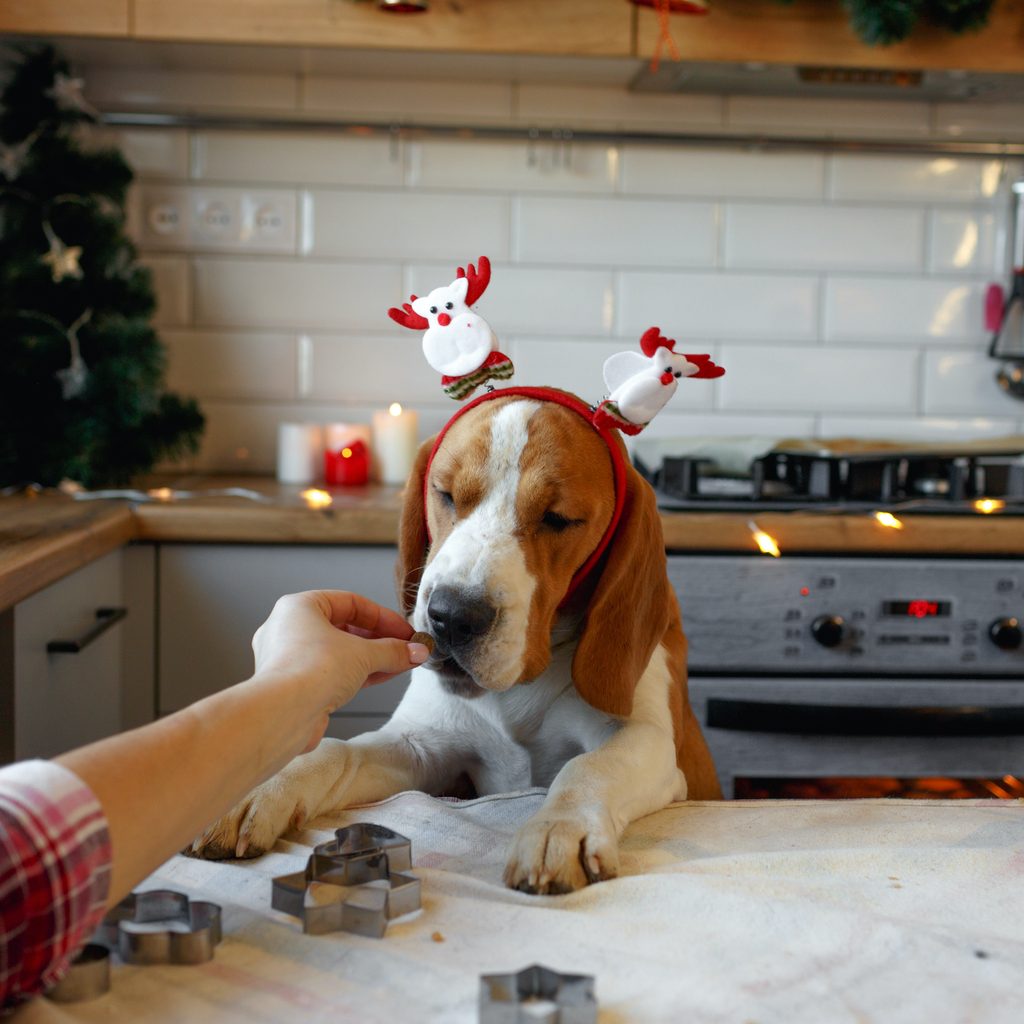
These are the Christmas foods your dog can eat — if you prepare them correctly
Luckily, there are several ingredients your pup can indulge in, so you don’t have to be human food-free this holiday season (unless your vet recommends it, of course). Here are some of the most common holiday foods with the green light for canines. Just pay extra attention to the preparation instructions!
Can dogs eat turkey? Yes, but make sure to keep their pieces plain
As you may have found out over Thanksgiving with your pup, turkey can be both safe and delicious for dogs. In fact, you may even find it as a protein source in many packaged dog foods, though you can treat it a bit differently when preparing it from home. Make sure you don’t feed your pup any turkey that’s been stuffed with, coated with, or cooked alongside herbs, spices, garlic, or onion. Keep it plain, please!
Chestnuts can be a yummy treat for the whole family
Roasting over an open fire, anyone? These nuts are totally safe for your furry friend to enjoy in small quantities, as they’re non-toxic to animals, according to the ASPCA. You should consider chopping up this snack before serving it to your pet, though, as it’s still a choking hazard.
Cranberries are great for more than sauce, though your pup might even eat them whole
This berry is stuffed full of antioxidants, vitamins, and even urinary support for both humans and dogs. Yep — that means it’s safe for canines, too, as long as it’s not combined with any sugar, artificial sweetener, or spices. It might be tempting to share fresh cranberry sauce, too, but you can only do this if there are no sweeteners at all! A better idea may be to set a few berried aside for your furry friend.
Boiled or baked potatoes can be for everyone – skip the sauces for your pup, please!
Potatoes are another ingredient that needs to be prepared correctly to be safe and healthy for dogs. Boiled or baked potatoes are just fine to share with your pup, but you may want to hold off on mashed potatoes. This yummy side dish is not toxic to dogs but can cause stomach upset with dairy products and other add-ins. Remember to keep potatoes plain for your dog no matter how you prepare them!
Vegetables might not be a crowd favorite, but they’re healthy for both people and pups
For the most part, plain veggies are a safe snack for your fur baby. They can be raw, cooked, and even chopped for easier eating, though you’ll want to ensure that they’re plain. As much as you might like your vegetables with a little seasoning, your dog’s body will not.
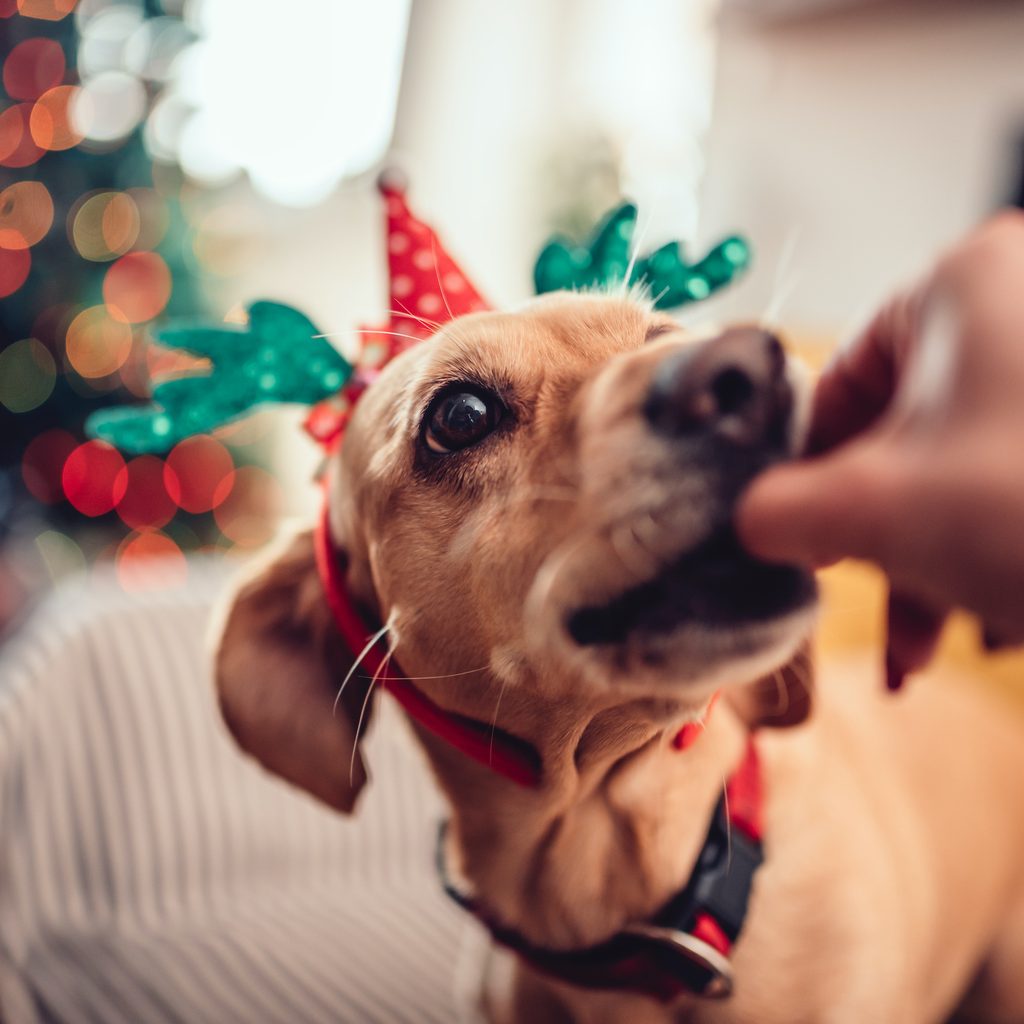
Christmas foods your dog cannot eat — not even a bite!
Although you can share a lot with your furry friend this holiday, there are also many foods you shouldn’t give to your pup, including the following.
Chocolate is a major no-no for canines
This one may go without saying, as many pet parents already know about the dangers of chocolate. This sweet treat can be toxic or even deadly to canines. Purina explains that theobromine, a chemical found in chocolate, causes convulsions, tremors, or even heart problems in dogs.
Peppermint might smell and taste delicious, but it’s toxic for pets
This fresh-tasting herb may grace nearly every dessert during the holidays, but it should not be on your pup’s plate. The plant itself is toxic to dogs, cats, and horses, but that means more for you! Peppermint can be tricky, though, as it’s not only an ingredient in foods. Peppermint oil is also unsafe for animals to be around, so make sure your space has plenty of ventilation before lighting that minty fresh candle (via VCA).
Gravy isn’t a healthy choice for your dog, though there are substitutes to try
Gravy might seem like something your dog would enjoy — and it probably is — but its excess fat, salt, and add-ins may upset their stomach or lead to negative health effects, according to Purina. Luckily, there are many gravy-flavored treats for dogs available at popular pet stores. Bone broth can be another great substitute if you need something to pour over your dog’s kibble.
Stuffing contains ingredients that are unsafe for dogs
As delicious as it is, stuffing is full of many ingredients that dogs shouldn’t have, including onions, spices, and herbs. Besides, feeding your pup protein, like turkey, will be a healthier use of extra calories!
Macadamia nuts and walnuts can be dangerous, so keep them away from prying paws
Although these nuts make excellent gifts for Christmas, they should not be given to your four-legged friend. Both macadamia nuts and walnuts contain a toxin that can cause vomiting, loss of coordination, hyperthermia, and even depression, though the American Kennel Club notes that scientists haven’t identified the exact toxin that causes these symptoms.
Fruitcake is not canine-approved, though it may not be approved at all, either
Although this holiday treat gets a bad rap, your pup may still want a bite. However, the sugar, spices, and dried fruit in the cake can be extremely toxic. Remember — grapes, raisins, and currants are some of the top no-nos for canines. This isn’t a very well-loved treat, either, so it might be a better idea to bake something else, anyway.
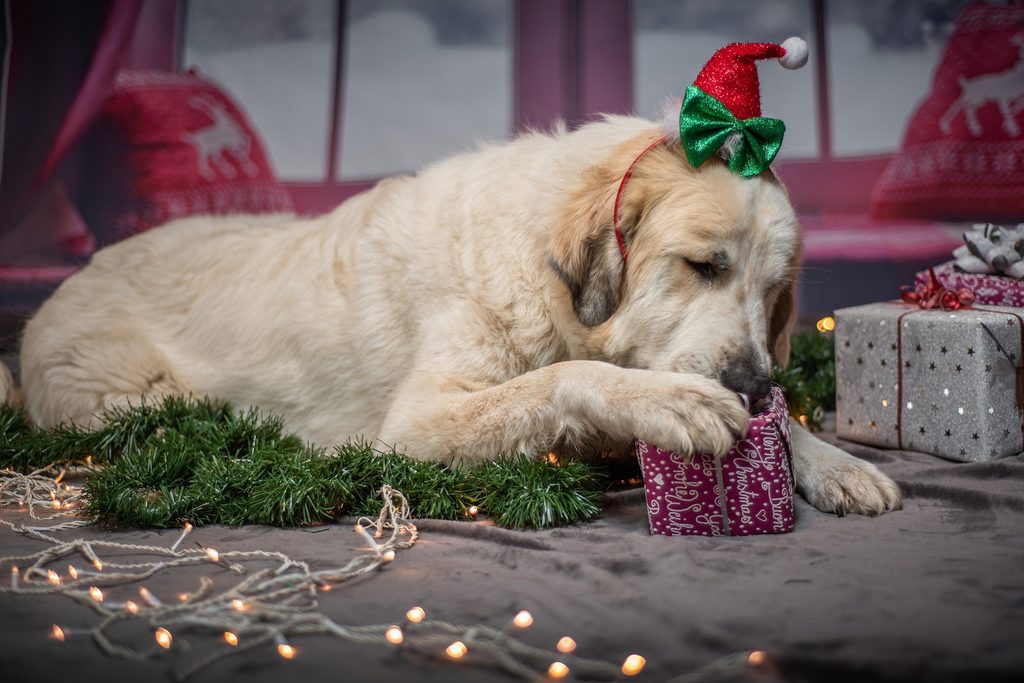
Instead of feeding your pup from the table, you can DIY a canine Christmas dinner
With all the dietary differences between humans and canines, it may feel like your furry friend is missing out on a lot of the holiday fun. We get it! Instead of risking their health by sneaking them a bite from the table, though, preparing a special dish just for them can be equally as special.
If your pup has a meat of choice, cooking and chopping a small amount is a great way to start. You can mix this with some of their regular kibble or even layer it on top of wet food. Add a few festive morsels like cranberries or potatoes. Many dogs also appreciate a drizzle of bone broth to moisten the food and give it some extra flavor. Keep in mind that your dog’s meal should total the same amount they eat in a normal dinner so they avoid overeating. You can always give them a snack later!
Deep breath! It may sound like a lot, but it just takes a watchful eye to keep your dog safe during the holidays. Keep your plates away from the edge of the table, and make sure everyone knows what they can and can’t feed your pup. And don’t forget to enjoy your Christmas!



